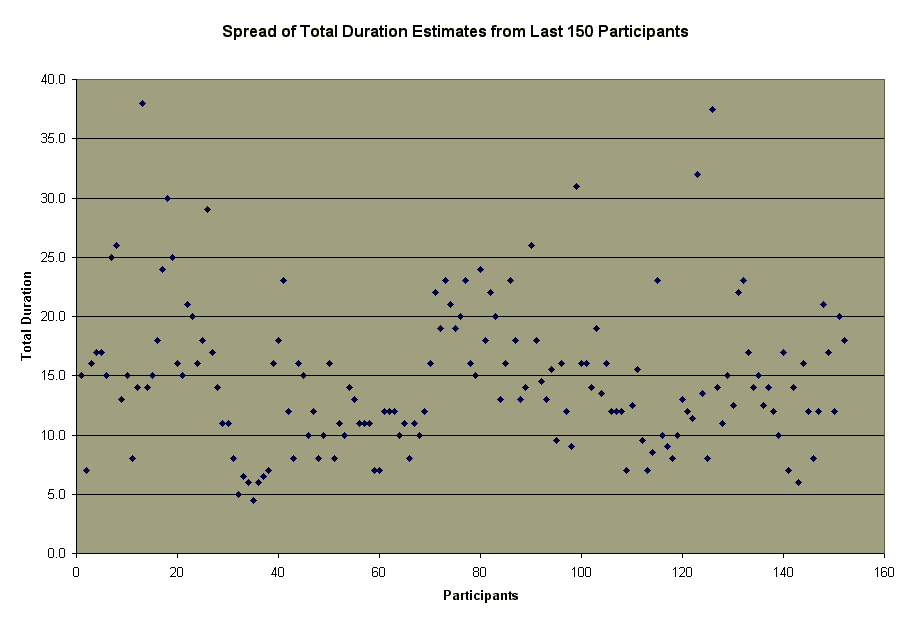Improving Estimating Quality
Estimating lays the foundation for planning, scheduling, and management of business critical projects. It is also critical for budgeting, bidding and contracting. Achieving consistent, quality estimates is critical to business success.
However, many companies lack systems and procedures to:
- ensure consistency in estimating across the enterprise
- easily define, benchmark and refine corporate estimating standards
The potential long term benefits of instituting an effective solution to this problem are enormous.
Qualifying the Problem in Producing Consistent, Quality Estimates
Consider the research compiled by Mr. Buddy Jacks, a leader in workflow process training. For over seven years, Buddy has conducted training sessions for over 1,500 planners and estimators for top companies in the refining and petrochem industries. In each of these sessions, Buddy conducts an exercise where he asks the class to estimate and plan a series of jobs. Every participant is given the exact same information to form the basis of the plan. The results of his exercise are alarming (see graph below).

Buddy has found that the level of detail planned in his classes consistently ranged from 3 to 26 tasks for one particular test case. The total duration for the job ranges from 4 to 38 hours! These results are typical for all of the cases that Buddy has been using over the years. Clearly, with that much deviation, the risks to business success demand a solution.
Static Templates are not a Solution
Some companies have developed large libraries of static templates for repetitive work. Unfortunately, using static templates still requires the planner to modify the plan to match current circumstances (scope changes) including adding, deleting or modifying work. The probability for inconsistencies and errors to occur will increase proportionately with the number of modifications that are required.
Static templates present problems for managing the library of scenarios (to mitigate the probabilities for error in "on-the-fly" customizations). As the number of maintained scenarios increase, the ability to benchmark and adjust estimates at the detail level decreases. No one has the time or inclination to compare actuals against multiple template scenarios (and to update estimates in each one).
Solving the Problem in Producing Consistent, Quality Estimates
eTaskMaker® allows a company to standardize estimating consistency across the enterprise by offering estimating modules incorporating best practices to all planners (regardless of experience or ability). Since they encompass multiple scenarios, eTaskMaker estimates are scaleable and manageable - reducing the amount of "on-the-fly" customizations and opportunities for introducing errors and inconsistencies. eTaskMaker uses variables to generate estimates with formulas - facilitating the benchmarking of estimates against a single estimating formula (just one time at the detail level) to continually improve the quality of the estimates.
eTaskMaker offers a robust solution to producing consistent, quality estimates. It can be an important key to implementing a program for benchmarking and improving estimating best practices for long term benefits to the bottom line.
Authored by Bernard Ertl, Partner, InterPlan Systems
Bernard Ertl has a bachelor’s degree in Computer Science and extensive field experience planning and managing turnarounds in the oil refining and petrochemical process industries.
Supporting Research by W.G. (Buddy) Jacks, President, Industrial Planning Consultants
Mr. W.G. (Buddy) Jacks is a leading provider of training on workflow processes for estimating, planning, scheduling and managing daily maintenance to top Fortune 1000 companies in industry for over seven years:
Industrial Planning Consultants
58 Raintree Court
Lake Jackson, TX 77566
